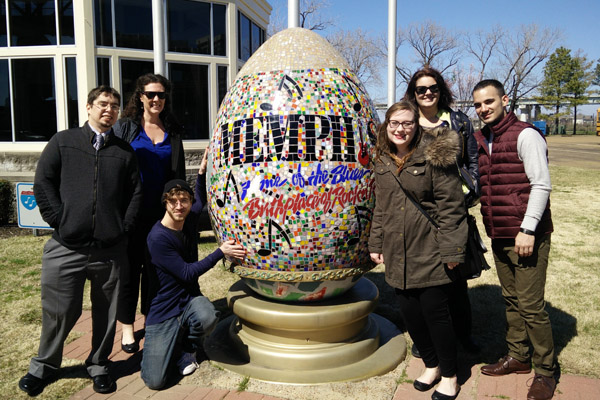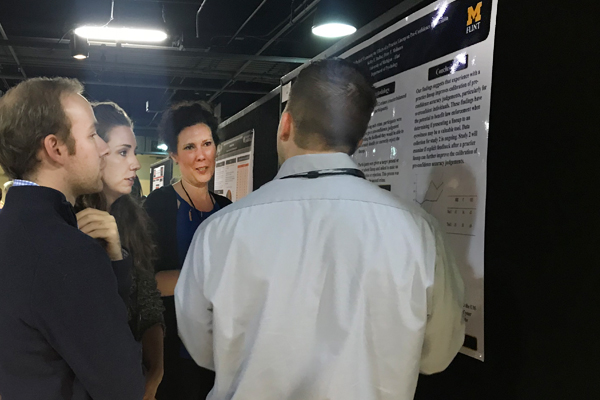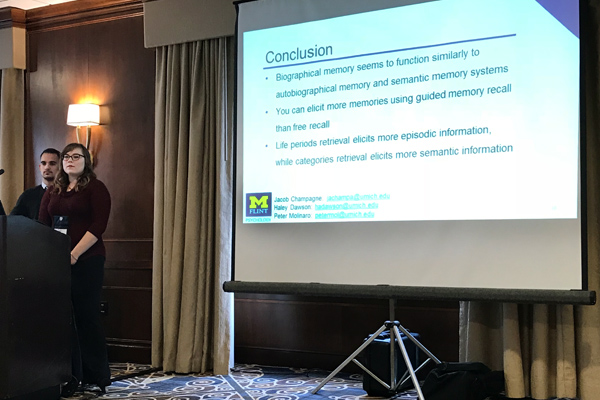UM-Flint Psychology students bring forensic research to Memphis

Each year, the American Psychological Association presents its American Psychology-Law Society (AP-LS) conference to bring together top psychology experts, educators, and researchers with those from the field of law. UM-Flint Psychology assistant professor Peter Molinaro, PhD, and several of his research assistants were invited to share their work at the prestigious event. It is an honor, he noted, that is not often extended to undergraduate students.
Dr. Molinaro is an experimental psychologist who focuses on applying principles of cognitive and social psychology to legal and forensic contexts. His research involves studying deception, investigative interviewing, eyewitness memory, and lone-offender terrorism. His work has been utilized by law and legal institutions, including the FBI.
The Impact of Research
Jacob Champagne, a UM-Flint Psychology Lab Manager and research assistant to Dr. Molinaro, graduated in 2017 with a degree in applied psychology (forensic/legal concentration) and minors in political science and substance abuse treatment/prevention. He expects both his on-campus opportunities and his experience presenting research in a professional setting will be helpful with his eventual graduate school applications.
Champagne's AP-LS presentations focused on research related to witness testimony from cooperative sources—or witnesses who know a suspect. "Crime, unfortunately, will always be a part of society," said Champagne. "I was drawn to this research in an effort to develop a solution to not only the problem of gaining information from witnesses, but developing tools law enforcement can use in the real world."
"I was very excited to attend the AP-LS Conference to share our research, expand upon our ideas, and gain new ones," he added. "Research is ever-changing. This conference is valuable to not only my research now, but in the future." His colleagues who attended the conference echoed this sentiment, noting the value of interacting with a wide variety of professionals and learning about the latest research in their field.

Haley Dawson, a 2017 alumna, graduated with majors in biology and psychology and a minor in gerontology. Her research focuses on eyewitness memory and deception detection.
Dawson joined Molinaro's lab because she was looking to gain some research experience. "So the opportunity to conduct research is what drew me in," she recalled, "but my interest in the field is what kept me here. I actually changed my career plans after being in this lab and plan on attending grad school with a focus in forensics."
"I specifically presented on something called biographical memory, or our memory for other people (such as a close friend, a family member, or colleague)," she explained. "We were trying to see if we could increase the amount of information people could recall about someone they knew through a guided recall."
"Now that I've presented at a national conference, I feel like I can do anything!" said Dawson. "I gained a lot of really valuable knowledge in speaking with professionals, how to give a good presentation, and also was inspired by so many research ideas from the conference. I have pages and pages of my notebook I took to the conference, with notes and ideas I got just from listening to others talk about what they're passionate about."

Kelley DuBuc is a research psychology senior with a minor in political science. Her interest in forensic psychology was piqued during a cognitive psychology course with Dr. Molinaro in which they watched a video on witness misidentification that led to a wrongful conviction. "I was moved by their story," remembered DuBuc. "I find it fascinating that as humans we can be so confident in our memory and rarely stop to consider all the things that can potentially influence our memories."
Since then, DuBuc has been focusing her research on pre-identification confidence and its effect, or lack thereof, when viewing a suspect lineup. She hopes her research will find a way to improve the relationship, leading to more accurate outcomes. "The research that I help with has real-world implications and the potential opportunity to greatly impact the criminal justice system," she said.
Kevin Michaels, a recent graduate of the UM-Flint psychology research program, presented "Interpretations of Ambiguity" in Memphis. His research considers the influence of situational ambiguity and feelings of "creepiness" on eyewitness memory and accuracy rates of picking suspects from a police lineup. It combines his interest in two previous projects and was born from a brainstorming session with Dr. Molinaro.
"I am often drawn to lineup research because it is one of the many ways that can potentially reduce false incarceration rates," said Michaels. "Any research that could reduce the chance of innocent people spending time in prison for crimes they did not commit is very important in my opinion."
A Part of UM-Flint Psychology
Each of the research assistants who attended the AP-LS conference were able to do so because of Dr. Molinaro's guidance in the classroom and in the lab.
"I think one of the things I have enjoyed most about working with Dr. Molinaro is how he gives us many opportunities to learn a wide variety of skills, while constantly giving us useful critical feedback," said Michaels. "He does an amazing job of communicating and making sure every lab member feels involved. I also enjoy how well he listens to and encourages the thoughts and ideas of all lab members."
"I love how involved we are as research assistants in Dr. Molinaro's lab," added Dawson. "We're able to give our input, contribute to the studies, and really shape the direction in which the lab is going. He also provided the framework for a really open lab culture. I feel like I'm always working with close friends—even though I didn't meet any of my research partners until the lab. Since we were there from the start, we all really have a special bond."
Hands-on research and one-on-one faculty interactions can be rare at the undergraduate level, but both are hallmarks of the UM-Flint student experience.
Jeannette Stein, PhD, chairwoman of the UM-Flint Psychology Department, added, "We are very proud of the research opportunities available within our programs. High standards, coupled with Dr. Molinaro's support, provided students with the direction and motivation to share their work with the larger scientific community."
"The undergraduate research experience has been widely studied and we know it improves tolerance for obstacles, independence, self-confidence, and readiness for more demanding work," Dr. Stein continued. "These benefits are an advantage in any career path [and] these experiences make them better students."
"Co-curricular activities like research and academic travel have a substantial and positive impact on student satisfaction and success," added Susan Gano-Phillips, PhD, Dean of the College of Arts and Sciences which houses the UM-Flint Psychology Department. "I'm so proud of these students for their outstanding work, and also pleased to know how meaningful they've found it to work with Dr. Molinaro and their fellow research assistants, and to attend this conference. This is just the beginning for them, and I can't wait to see where they go!"
For each of Dr. Molinaro's assistants, the future includes continuing their education, research, and contributions to their chosen field. "Forensic psychology isn't really what you see on Criminal Minds, CSI, or the ID channel," concluded Dawson. "We don't sit around solving cold cases or figuring out where serial killers will strike next—that's really only on TV. Rather, we try to take processes and procedures that are already in use and improve on them—or propose new techniques altogether. There's a surprising amount of techniques that are under researched or not empirically validated, which is why I think forensic work is so important."
Related Posts
No related photos.
UM-Flint News
The Office of Marketing & Communications can be reached at mac-flint@umich.edu.